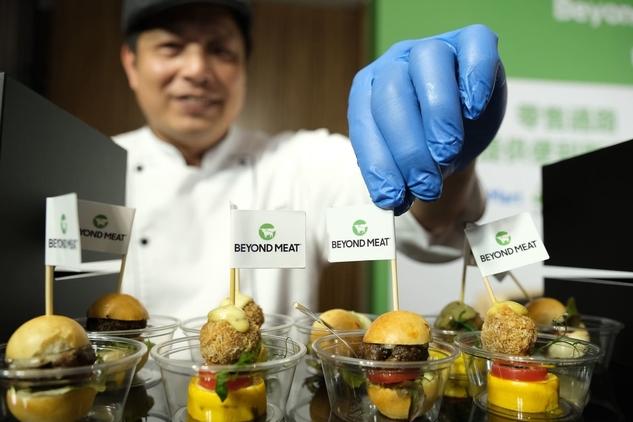Unwrapping the Secret Behind the Multi-Million Dollar Faux Meat Industry

Source:Kuo-Tai Liu
What is the mysterious “future meat” that big names like Bill Gates and Leonardo DiCaprio are investing in? Why is it so popular that it’s often sold out in Taiwan? Who exactly is eating this high-tech “vegan meat”, and what does it portend for the future of our stomachs?
Views
Unwrapping the Secret Behind the Multi-Million Dollar Faux Meat Industry
By Sydney PengCommonWealth Magazine
Jeff Ku, President of momo.com Inc., reveals that the American meat substitute brand “Beyond Meat” has been raking in ten million Taiwan dollars every month since it entered the Taiwanese market in April. Merely two months after it hit the shelves, the competing brand “OmniPork”, also a kind of vegan meat made from pea, soy, mushroom, and rice, became the top-selling frozen meat per diem in the Taipei 101 branch of Jasons Market Place. Beyond Meat is five times pricier than conventional hamburger meat; OmniPork is thrice as expensive as fresh pork. What makes them so successful?
Beef patty, fried chicken, meat dumplings, braised pork rice. Are you sure that’s meat you’re eating?
Meat analogues made from vegetarian ingredients, colloquially called vegan or faux meat, may be rising in popularity in Taiwan faster than you think.
On Dec. 9th, TV and online retailer momo.com Inc. (富邦媒體科技) held a press conference for fake meat. It announced it will be aggressively promoting “Beyond Meat”, an American brand of meat substitutes, through its television and online shopping channels, as well as the convenience store chain FamilyMart, the fast-food chain Mos Burger, the organic food store Leezen, and the casual dining restaurant chains TGI Fridays and Royal Host.
Jeff Ku (谷元宏), President of momo.com Inc., says that since Beyond Meat entered the Taiwanese market in April, “We’ve made about ten million Taiwan dollars every month, even though we don’t have the entire product line ready yet.” Who are their customers? “Young and athletic thirtysomethings eat a lot of vegan meat,” clarifies Chairman CF Lin (林啟峰).
In the high-end chain supermarket Jasons Market Place, Wagyu beef patties from Australia are selling at a discount price of only 100 dollars for three pieces. A single 113-gram piece of Beyond Meat’s “future hamburger meat” sells for around 150 dollars. A piece of Beyond Sausage, which is simply a hotdog made from beetroot, pea, and coconut oil, costs about the same. Faux meat is five times pricier than real meat. How are they seducing young customers and raking in tens of millions every month?
Have you read?
♦ Behind Taiwan's Vegetarian Night Market Phenomenon
♦ An American Vegetarian in Taiwan
♦ Taiwan: Veggie Heaven
Faux Meat That Bleeds is Flooding the Taiwan Market
It is a sunny weekend in Taipei. Hsieh Lin-pao (謝麟寶), a 58-year-old engineer from Singapore, is dallying in front of Beyond Meat’s first independent store in Taiwan: the “V Burger” in the shopping mall Breeze Center (微風廣場). After a while, he selects a piece of Beyond Burger’s vegan beef and a piece of OmniPork’s (新豬肉) vegan pork for his lunch. The cost: 180 Taiwan dollars.
The Singaporean Hsieh gestures to the half-eaten Beyond Burger in his hand as he explains how it is tastier and more tender than ordinary vegan meat. “The brand ‘Impossible Burger’ even produces faux meat that tastes like a piece of rare, bloody steak,” says Hsieh. A vegetarian of twenty years, he knows good fake meat when he tastes it.
Impossible Burger is a vegetarian meat substitute under the Impossible Foods brand. Patrick O. Brown, a former pediatrician and current professor emeritus in the department of biochemistry at Stanford University, founded the company in 2007. Two years after, Ethan Brown (no relation) founded Beyond Meat to compete for the vegetarian meat market.
The two Browns are both vegetarians, and they both created vegan patties that taste like beef and bleed like meat. Beyond Meat uses beetroot, pea protein, and coconut oil to concoct a purple “gravy”. Impossible Foods uses “heme”, produced in a synthesis process involving soybean root leghemoglobin and yeast, to add the illusion of blood to meat analogues made from wheat protein, potato protein, and coconut oil.
 Vegan meat can be made to taste “rare” and look bloody. Can it satisfy the palates of both vegetarians and meat-lovers to become the sustainable meat substitute of the future? (Photo by Justin Wu/CW)
Vegan meat can be made to taste “rare” and look bloody. Can it satisfy the palates of both vegetarians and meat-lovers to become the sustainable meat substitute of the future? (Photo by Justin Wu/CW)
Not only do their technologies differ, their market strategies are also dissimilar.
Impossible Foods is more reactionary, picking the best time to enter a new market based on what’s trending. For instance, the Chinese market became very receptive to meat substitutes after the outbreak of African swine fever. In early November, Patrick O. Brown participated in the China International Import Expo. Afterwards, he told CNBC this was frankly the best time to enter the Chinese market: “It’s a huge opportunity, a perfect opportunity for us.”
In contrast, Beyond Meat is very aggressive in its approach to Taiwan and the Asian market. In early November, Executive Chairman Seth Goldman told Reuters that they’re committed to producing in Europe in the first quarter of 2020, while production in Asia is projected to begin before the end of 2020 to meet local demands.
OmniPork Owns a Spot in Frozen Food’s Top Three
David Yeung is the Founder of Green Monday, Beyond Meat’s partner in Asia. He observes that while beef is a mainstay in Western cuisine, the Asian market goes one step farther and asks: “Where’s the pork?”
“The response we received during our first two months in Taiwan was far more positive than we expected, we were often sold out,” the Hong Kong-based Yeung tells CommonWealth Magazine during a phone interview. “Colleagues who work in supermarkets tell us that out of hundreds of different meats in the frozen foods section, we are likely among the top three sellers.”
Like Beyond Meat, OmniPork launched a three-pronged assault. Not only can you find their faux meat in fast-food joints and high-end eateries such as the Grand Hyatt Taipei and Taipei Marriott Hotel, frozen retail packages also hit the shelves of Jasons this September.
When asked by reporters, Wellcome Supermarkets (惠康百貨) Chief Marketing Officer Andrew Chen (陳子彥) provides more details: “It is true that after we began selling OmniPork, it became the top-selling frozen meats product for one day in one of our supermarkets.”
The main consumer group is between thirty and forty years of age. Over half of them are vegetarians. They shun meat not only for religious reasons, but also out of concern for their personal health and the global environment.
Walk into a Jasons supermarket and you will easily spot this vegan meat made from pea, non-GMO soy, mushroom, and rice. It is often placed alongside Ibérico pork, turkey, and Chinese pork balls. Also on display are recommended recipes that combine the faux meat with Mapo Doufu or kale. It’s clear that this delicacy is targeted toward vegetarians and meat-lovers alike.
Worth noting is that in the same freezer, a 100-gram pack of ground pork costs around 50 Taiwan dollars. Whereas the 115-gram pack of OmniPork costs 175 dollars. It is not cheap.
At the moment, the market is waiting for demand to increase so prices can drop. Taiwan has a relatively developed culture of vegetarianism. Vegetarians make up more than ten percent of the population. These new brands of vegan meat are challenging the taste buds of vegetarians with all new flavors. Yeung says shumai (燒賣) and dumplings made from faux meat are all possible with these new products.
The challenge is in the taste. If it tastes too much like meat, vegetarians may turn away. But, if it doesn’t feel meaty enough, it will not appeal to the broader non-vegetarian market. Faux meat brands have their work cut out for them. They have to investigate local dining habits, find the best recipes for their meat analogues, and design a flavor that appeals to the lowest common denominator.
Breeze Center’s “V Burger” may have a solution. They are making spicy dry noodles with OmniPork. The special spicy sauce masks the vegetable taste and recreates the down-to-earth flavor of traditional Taiwanese cuisine. Whether the hefty 160-dollar price tag will become a barrier between vegetarians and nonvegetarians is a question that only time can answer.
Can faux meat really win over both old-school vegetarians and meat-lovers? If the twin hurdles of a higher price tag and a different culinary culture can be overcome, these vegan meats may yet change the future of food as we know it.
Translated by Jack C.
Edited by Sharon Tseng












